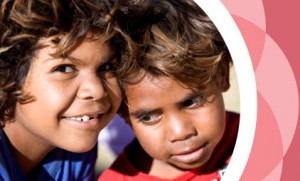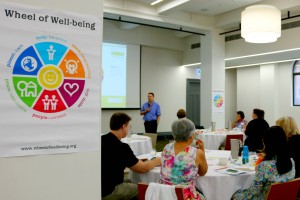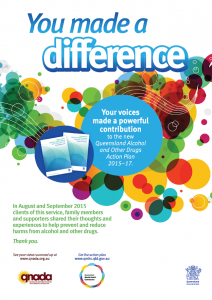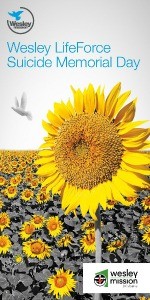160321-1489-1024x650.jpg
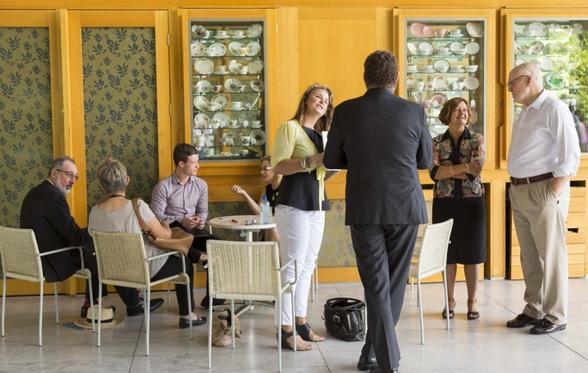
The virtue of complaint: Sharing knowledge and ideas for a more accessible mental health and drug complaints system in Queensland.
Commissioner's Update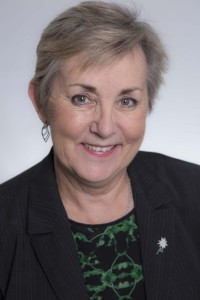
This month we’ve made significant strides forward in a number of key work areas of the Commission. Consultation is the word of the moment with a number of items open for comment. Don’t miss your chance to share your views with us.
You can keep up to date on our consultation opportunities through our social media channels. Follow us on Twitter or Facebook.
A national approach
On 17 March the leaders of Australia’s national and state mental health commissions met in Perth. Read the meeting communique.
At the meeting, Commissioners agreed to approach the federal government regarding the review of the Mental Health in Multicultural Australia (MHiMA) project, to reinforce the need for a national entity and recommend collaborative governance to provide advice to governments on policies and programs. Read QMHC’s submission to the MHiMA project review on our website.
Listening to the needs of rural and remote communities
This year I’ve visited some rural communities to listen to locals about key issues impacting mental health and wellbeing. Longreach service providers had some powerful messages about the needs of the bush. See their video
I look forward to more trips throughout Queensland over the coming months to hear more about the specific issues impacting rural and remote Queensland and get their input on an action plan for Queensland.
My apologies if I don’t make it to your town. You can still be heard by responding to our discussion paper Towards a Queensland Rural and Remote Mental Health and Wellbeing Action Plan. More details below.
Improving Aboriginal and Torres Strait Islander social and emotional wellbeing
We’re appreciative of the wisdom and insight that Aboriginal and Torres Strait Islander leaders have given towards developing a Queensland Aboriginal and Torres Strait Islander Social and Emotional Wellbeing Action Plan. It’s important that the broader Aboriginal and Torres Strait Islander community across Queensland also have a say by responding to the discussion paper Improving Aboriginal and Torres Strait Islander Social and Emotional Wellbeing in Queensland, or attending a community forum. More information is below.
Human rights
What will a Human Rights Act mean for people living with a mental illness in Queensland?
Thanks to all who shared their views and experiences with us. Keep an eye on our website over the next week for our submission to the Parliamentary Inquiry.
Rural and remote mental health and wellbeing
Improving mental health and wellbeing for people living in rural and remote Queensland is a priority.
QMHC is developing a Rural and Remote Mental Health and Wellbeing Action Plan for Queensland which will set out actions to be taken by government agencies, non-government organisations and other partners.
Have your say
We’ve released a discussion paper to get your input for the Action Plan. All feedback received will be considered in the development of the final Action Plan.
The discussion paper is open for consultation until 29 April 2016.
Download the discussion paper on our website
Aboriginal and Torres Strait Islander SEWB
Social and emotional wellbeing influences the everyday lives of Aboriginal and Torres Strait Islander Queenslanders, their families and the community. It influences life outcomes in all areas including educational outcomes, employment and economic participation, physical health and mental health.
Aboriginal and Torres Strait Islander peoples have known about the importance of social and emotional wellbeing for thousands of years and it has enabled Aboriginal and Torres Strait Islander people to endure historical and present day hardship and adversity.
However, there is a need to support improved social and emotional wellbeing of Aboriginal and Torres Strait Islander peoples, families and communities.
Have your say
We’ve released a discussion paper to get your input on a Queensland Aboriginal and Torres Strait Islander Social and Emotional Wellbeing Action Plan. Get the discussion paper on our website
The discussion paper is open for consultation until 30 June 2016.
To continue the conversation, QMHC will also be holding community forums throughout Queensland to hear from Aboriginal and Torres Strait Islander people about their experiences and what they believe can be done. Forums will be held in Thursday Island, Cairns, Mount Isa, Townsville, Rockhampton, Toowoomba, Logan, Ipswich and North Brisbane from April until June 2016. See our website for more information.
Promotion, prevention and early intervention
Wellbeing unleashed
Last month QMHC partnered with UK’s Maudsley International to improve mental health and wellbeing.
Maudsley’s Head of Population Mental Health, Tony Coggins, visited Brisbane to work with government, non-government and community representatives in a number of forums.
Early Action
International mental health and wellbeing expert Tony Coggins addressed the Early Action Reference Group about embedding mental health into policy and practice.
It was the first meeting of the Reference Group, which oversees and supports implementation of the Early Action: Queensland Mental Health Promotion, Prevention and Early Intervention Action Plan. The group provides leadership, oversight and coordination of promotion, prevention and early intervention activities being undertaken across Queensland. It includes members from a number of Queensland Government agencies and non-government organisations.
Sharing action
Tony Coggins also met with the Department of Education and Training, Workplace Health and Safety, and social housing stakeholders to explore the use of the Mental Wellbeing Impact Assessment (MWIA). Tony will continue to train Queensland stakeholders in MWIA during his next visit later in the year. More information about MWIA here
Supporting children and young people
Mental Health Coaches also had the opportunity to workshop wellbeing with Tony Coggins last month.
Established by the Department of Education and Training, Mental Health Coaches will play a key role in planning and implementing initiatives to build inclusive, safe and supportive learning environments in schools.
Wheel of wellbeing
Tony Coggins shared his knowledge of the Wheel of Wellbeing at a workshop last month. More than 40 people from across Queensland can pass on their wellbeing learnings to their local communities.
Widely used across the UK, the Wheel of Wellbeing builds knowledge and understanding of positive mental health and wellbeing in individuals and communities. Informed by an extensive body of evidence, it translates theory into positive practice under the themes Body, Mind, Spirit, People, Place and Planet.
Find out more about the Wheel of Wellbeing tips, tools, activities and ideas. The free materials are designed to inspire people to develop new ways to improve their wellbeing, for themselves, their families and communities.
Lived experience
Mental health complaints made simple
There’s a new information package to help people when they have a complaint about Queensland’s mental health, alcohol and other drug system.
QMHC’s package aims to make the process of making a complaint in Queensland less frustrating and help people find the right agency to hear their complaint.
It includes a convenient wallet card with key complaint information, supported by more detailed information on the Commission’s website.
We launched the package at the Virtue of Complaint public forum, which explored how existing mechanisms in Queensland’s mental health and drug complaints system could be made more accessible to the people who use those services. Missed the forum? Watch the video
Contact us to get a copy of the wallet card or get more information on our website
Building a picture of engagement
Our thanks to the mental health, alcohol and other drug services who participated in our recent survey to find out how they are engaging with those who use their services. Your responses will help build a picture of how engagement is occurring throughout Queensland and will shape the way QMHC supports services to engage with consumers, clients, families and carers into the future.
Results are being analysed and will be made available on our website in the coming months.
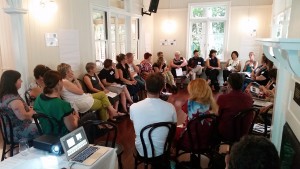 Improving engagement
Improving engagement
Some great ideas for improving consumer, carer and family engagement have come out of two Think Tanks in Cairns and Brisbane. The Think Tanks explored innovative ideas for people to have greater input into service design in Queensland’s mental health and alcohol and other drugs sector. They complemented the online Stretch2Engage Think Tank, which included discussion with international thought leaders from a range of sectors, including business and arts.
The Think Tanks are part of a project funded by QMHC to develop a contemporary set of best practice principles to guide the engagement of people using mental health, alcohol and other drug services and their families and friends.
National Mental Health Plan
QMHC has been contacted this week by consultants working on the 5th National Mental Health Plan with a request to nominate a consumer representative to inform the drafting of the plan.
The request has been referred to Queensland Voice as the peak body representing the interests of consumers in Queensland, with a view to selecting a person who can represent a broad range of interests.
Suicide prevention
Queensland’s Suicide Prevention Reference Group has met for the first time.
The Reference Group will support implementation of the Queensland Suicide Prevention Action Plan, leading, overseeing and coordinating suicide prevention and risk reduction activities being undertaken across the State. It includes 12 Queensland Government agencies, non-government organisations, the Australian Government’s Primary Health Network, people with a lived experience and other experts.
Alcohol and other drugs
AOD Family and clients’ priorities
Friends, families and clients of alcohol and other drug services made a powerful contribution to shaping the new Queensland Alcohol and Other Drugs Action Plan 2015-17. They outlined a number of priorities summarised here
Read the responses to these priorities in the Action Plan
Our thanks to everyone who shared their views and experiences – you made a difference.
Action to reduce stigma and discrimination
Stigma and discrimination can have harmful impacts on individuals, families and communities.
As well as impacting the ability of alcohol and other drug service users to be socially connected and to participate in education, training and employment, stigma and discrimination also acts as a barrier to people seeking help when they need it.
The Queensland Alcohol and Other Drugs Action Plan 2015-17, found there is limited research in this area. QMHC has commenced filling this gap by commissioning research into ways to reduce stigma and discrimination.
The final report from this research will identify areas of focus to reduce stigma and discrimination, and potential actions for Queensland to take.
System reform
Implementing legislation
QMHC is participating in several working groups to implement the Mental Health Act 2016. Our focus is on ensuring that all aspects of implementation are consistent with the Principles in the Act.
For updates on implementation see the Queensland Health website
Embracing Open Dialogue
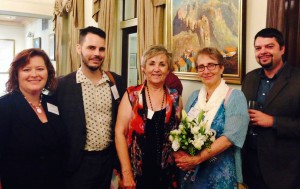 Last month QMHC partnered with RANZCP Queensland Branch to host a presentation by international expert Dr Sandy Steingard.
Last month QMHC partnered with RANZCP Queensland Branch to host a presentation by international expert Dr Sandy Steingard.
Dr Steingard is a leading practitioner of Open Dialogue, a treatment model developed in northern Finland which aims to support the individual’s network of family and friends as well as respect the decision-making of the individual. Researchers have reported outstanding outcomes of Open Dialogue among individuals experiencing a first episode of psychosis.
In her presentation, Dr Steingard contrasted Open Dialogue with the medical model and highlighted the advantages inherent in the Open Dialogue approach. A key message was that Open Dialogue is not an anti-drug treatment model, but one that puts the person and their family at the centre where medication is considered as part of the treatment of the whole person.
Discussion about the potential to adopt the model in Queensland was very positive, particularly the proactive approach to including consumers and families.
The presentation was well received by psychiatrists, but there is a need for training and an acceptance by employers that greater investment upfront may be required for better longer term outcomes.
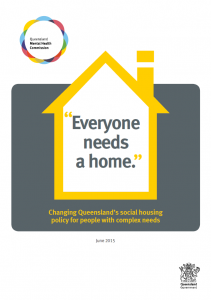 Demonstration housing pilot
Demonstration housing pilot
The Department of Housing and Public Works and Queensland Health are jointly implementing the Mental Health Demonstration Project, which will better support social housing tenants with mental health and wellbeing issues, or related complex needs, to sustain their tenancies. This project was strongly influenced by QMHC’s Ordinary Report Social Housing: Systematic Issues for Tenants with Complex Needs. The Ordinary Report is on our website
Based in the Chermside and Fortitude Valley catchment areas, service delivery began in January 2016 and will conclude at the end of June 2017. Over 100 people are expected to be assisted over the life of the project.
Key elements of the project are:
- strengthened capability of frontline service delivery staff and partners to support tenants
- expanded clinical mental health support
- new short-term non-clinical psychosocial and tenancy support services
- integrated case coordination and case management
- brokerage to purchase specialist supports or address service capacity issues.
These elements are supported by a learning and development focus for strengthening local collaborative networks, partially funded by QMHC.
The project will be evaluated by the University of Queensland’s Institute of Social Science Research to determine the effectiveness of the new service delivery model in achieving improved outcomes for vulnerable social housing tenants and government.
Further information regarding the project is available by contacting Ms Anita Nikolaou at the Department of Housing and Public Works.
Consumer experiences of telepsychiatry
In recent years telepsychiatry has become a routine part of mental health care in rural areas as there are significant benefits for mental health services, consumers and their supporters.
QMHC partnered with Enlightened Consultants to find out what makes for a positive experience of telepsychiatry and how the user experience might be enhanced in the future. With the support of the Darling Downs HHS, regular users of telepsychiatry were interviewed. Four main themes emerged from these interviews:
- telepsychiatry is a valued part of mental health care for people living in rural areas
- the ability to form a meaningful and positive relationship with the treating team is central to a positive experience of telepsychiatry
- having the same treating team over time can also increase satisfaction with telepsychiatry
- some consumers would like to involve a wider range of support persons in their telepsychiatry consultations and have access to telepsychiatry from home.
Read the report Informing the future of Queensland’s telepsychiatry services on our website.
Thank you to all those people who contributed.
Sector News
Suicide Memorial Day
Losing a loved one to suicide is a sorrow unlike any other, but you are not alone.
Wesley LifeForce Suicide Memorial Day service is an opportunity to come together in a spirit of comfort and hope and remember loved ones.
During the ceremony attendees are invited to bring a photo to the service to be displayed with a personalised message on the Memorial Wall.
When: 12.00pm, 21 April 2016
Where: King George Square, Ann Street, Brisbane City
Straighter Head Program
Charleville, Roma, Chinchilla and Croydon/Georgetown have been selected as the pilot sites for the Straighter Head Program. As part of the program, mental health training sessions will be available for people who work in the finance and services sectors to enhance their awareness of the risks and signs of mental health issues in themselves, their customers and clients, promote resilience, and to provide helpful resources.
The program is an initiative of the Royal Flying Doctor Service and the Australasian Centre for Rural and Remote Mental Health.
Training sessions will take place in May and June 2016. For more information visit the Facebook page or contact the coordinator Dr Jane Harte via email at jharte@westenet.com.au.
Grants
- Community resilience grants – Grants between $5000-$50,000 available to build community resilience and reduce the negative effects that droughts, disasters and other crises can have on people living in regional Queensland. More information
- Department of Education and Training Small Assets Grant Program for Early Years Services – Up to $50,000 available to eligible services to purchase resources or items. Applications close 18 April 2016. Find out if you’re eligible
- IRT Foundation 2016 Community Grants – Projects that demonstrate a positive impact on the health and quality of life of ageing Australians can apply for grants. Apply by 20 April. More information
- NAIDOC Week – Funding is available for local activities and events held during NAIDOC Week (3-10 July), to celebrate Aboriginal and Torres Strait Islander histories, cultures and achievements with your community. Applications close 29 April 2016. Find out more
- National Disability Conference Initiative 2016-17 – The Australian Government is inviting providers to apply to deliver services under the Disability, Mental Health and Carers Programme – Disability and Carer Support - National Disability Conference Initiative (NDCI) 2016-17. More information
- Mackay Community Foundation – Not-for-profit organisations in the Mackay region are invited to apply to The Mackay Foundation for grants of up to $3,000 for charitable projects. Find out more
- Sunshine Coast Regional Council minor grants – Funding is available for one-off projects, events, programs and activities. Find out more
- The Lord Mayor's Suburban Initiative Fund grants program – Applications up to $10,000 are available to community projects which contribute to the Brisbane Vision, by helping to achieve the aspiration to be a friendly and safe, active and healthy, clean and green or vibrant and creative city.More information or apply here
Resources
- Queensland Women’s Strategy – Released last month, the strategy provides a framework for government, the private sector and the wider Queensland community to take significant action to achieve gender equality in Queensland. Download the strategy or find out more on the website
- Drug Trends Bulletin – The latest Bulletin report titled Misuse of pharmaceuticals by regular psychostimulant users: are there mental health problems? examines the links between mental health issues and extra-medical or illicit use of pharmaceutical substances among regular psychostimulant users. Read the bulletin
- Mental Health Resources for Carers – A new website that aims to answer questions and provide coping support for those who are new to the mental health system in Queensland, have had a loved one diagnosed with mental illness or are in doubt in a caring situation. Visit MHR4C
- A practical guide for working with carers of people with a mental illness – This guide recognises carers are a crucial component of any partnership approach to service delivery and aims to assist staff across service settings in Australia. Download the guide
Events
- 18 April 2016 Mental Health and Housing Webinar series – A series of webinars designed for anyone in the community housing, homelessness or social services sectors who wants a deeper understanding of the potential complex mental health needs of their clients, and how best to respond to these needs. Download the webinar overview or register
- 19 April 2016 Supporting CALD Clients – A free webinar to assist organisations to manage access to interpreters for clients with difficulty communicating in English. Register
- 20 April 2016 NDIS Information Session and Workshop – Brisbane. Participant readiness activities delivered by MIFQ to prepare for NDIS. For more information or dates and locations download the MIFQ Newsletter
- 21 April 2016 Understanding eating disorders in young people webinar – A webinar for clinicians and other professionals working with young people in mental health, primary care, community or education settings. Register
- 27 April 2016 Addressing the social and emotional wellbeing of older LGBTI people webinar – A free webinar for mental health practitioners. Register
- 28 April 2016 Bridge the Gap – Partners in Recovery Gold Coast is exploring the gaps and barriers in the service system for individuals with severe and persistent mental illness. You are invited to inform the next stage of the journey. Download the flyer
- 29 April 2016 Mental Health, Alcohol and Other Drug Services Forum – Maroochydore. The Central Queensland, Wide Bay, Sunshine Coast PHN is holding this forum to ensure authentic communication and collaboration with mental health, alcohol and other drug service providers and members of the community. Register
- 6 May 2016 Master class on responsible reporting of suicide and mental illness – Sydney. Mindframe are presenting a one-hour master class at the Australian Press Council International Conference. More information
- 7 May 2016 A Place to Belong Wellbeing Day – For those interested in learning about wellbeing and growing through mental health challenges, their families, carers and friends, as well as workers in the mental health sector. Download the flyer
- 13 May 2016 Walk on the Wild Side Annual Symposium – For clinicians working in the field of alcohol and drugs. Early bird registrations are available until 30 April. More information
- 18-20 May 2016 The Australian and New Zealand Addiction Conference – Gold Coast. The Conference will include workshops, presentations and forums dedicated to sharing skills and understanding in the treatment of all addictive disorders in both adults and children. More information
- 27 May 2016 Generation Next Mental Health and Wellbeing of Young People Seminar – A variety of topics will be explored, including respectful relationships education, building resilience skills, the latest drug trends, self-harm, racism and mental health, radicalisation and more. Register online
- 18-19 July 2016 CAMS latest theory, clinical and research findings workshop with Prof David Jobes –This 1.5 day workshop for mental health workers, clinicians and therapists aims to facilitate the adherent use of CAMS (Collaborative Assessment and Management of Suicidality) via supportive training. Register here
Surveys
- 2016 Election – With a federal election gathering steam, the ABC has launched a survey to find out the most important issues that politicians need to address. Results will be used to inform the ABC's election coverage so is a good opportunity for mental health to get on the agenda. Have your say
- Act on Alcohol 2016 Survey – Act on Alcohol, a service that supports Queensland communities to address alcohol-related harm, has developed a short survey to help understand the issues relating to alcohol-related harm at a community level. The survey takes 10 - 15 minutes to complete. Take the survey
- UQ mental health carers survey – The purpose of this study is to demonstrate to government and the general public how much it would cost to replace the care that mental health carers provide. In order to participate you must: (1) be aged 18 years or older; (2) care for someone aged 16 years or older whose main problem is a mental illness; and (3) not be employed to provide your caring role. Participate
- Help build a better housing future for Queensland online survey – Provide feedback on a range of housing issues from homelessness and social housing through to affordable rent, home ownership and retirement to help shape development of a new Queensland Housing Strategy. Written submissions are also accepted. More information on the website
- Pathways to support services for victims/survivors of child sexual abuse and their families – This survey is a critical part of research being conducted by the Australian Institute of Family Studies to investigate how victims/survivors of child sexual abuse and their families access and navigate pathways to support services. Participate in the survey
Other
- National NAIDOC awards – Many Aboriginal and Torres Strait Islander people contribute to Australian society through art, music, culture, sport, education and training, environmental preservation and community leadership. If someone in your community deserves to be recognised for their contribution, nominate them for a 2016 National NAIDOC Award. Nominations close 18 April 2016. Nominate here
- LiFE Awards – Nominations are now open for the annual LiFE Awards, which recognise excellence in suicide prevention. Mainstream programs, local ‘grass roots’ organisations and dedicated individuals are encouraged to apply. Nominations close 22 April 2016. More information is available from Suicide Prevention Australia

